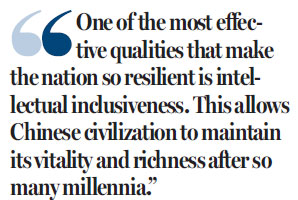Never forget the original intent
Updated: 2016-07-11 07:12
By Lo Man-tuen(HK Edition)
|
|||||||
Lo Man-tuen argues that the best way forward for Hong Kong is to maintain its real strengths within the framework of the 'One Country, Two Systems' policy
The keynote speech President Xi Jinping delivered at the conference commemorating the 95th anniversary of the founding of the Communist Party of China (CPC) in Beijing last week contains a section on the "One Country, Two Systems" policy. The theme of the speech is "to remember why we started it all and work resolutely toward the goal". Apparently it was meant to remind the general population as well as CPC members why the governing party came to be, how it led the Chinese nation to where it is now and what it needs to do from here. For the "One Country, Two Systems" principle, it is just as important to remember its original intentions to apply it faithfully in the governance of the Hong Kong Special Administrative Region.
The idea of never forgetting the original intention and carrying it through in life can be traced back to the Mahavaipulya Buddhavatamsaka Sutra (Flower Garland Sutra), very important scriptures in East Asian Buddhism. It can be summarized as commitment and consistency. The CPC was founded in 1921, when the Chinese nation was in desperate need of deliverance from the deathly grip of civil war and other man-made disasters as well as natural calamities. The original goal of the CPC upon its establishment was to motivate and lead the Chinese nation to salvation and survival as an independent country. It was founded to fight for the Chinese nation's future prosperity and continued existence in dignity.
The same theory applies to the adoption of "One Country, Two Systems" as the guiding principle for China's resumption of sovereign rule over Hong Kong. Its original intent is to allow Hong Kong society to keep its capitalist economy and way of life as a special administrative region of China directly under the jurisdiction of the central government. The past 19 years since the handover of sovereign rule over Hong Kong is proof the central government has remained firmly committed to the original intent of "One Country, Two Systems". And we have every reason to believe it will remain effective as long as we want it to be.

The Chinese cultural heritage, as an ancient civilization of more than 5,000 years so far, has blessed us with numerous intellectual marvels and spiritual beacons that guided the nation through all the natural and human hardships imaginable. One of the most effective qualities that make the nation so resilient is intellectual inclusiveness. This allows Chinese civilization to maintain its vitality and richness after so many millennia. The "One Country, Two Systems" principle is imbued with the same philosophy to maintain China's sovereign rule over Hong Kong without compromising the existing lifestyle of the city. It is also part and parcel of the "Chinese characteristics" in what the late leader Deng Xiaoping described as "socialism with Chinese characteristics".
President Xi noted in his speech that the implementation of the "One Country, Two Systems" principle in the past 19 years has been a widely recognized success. This gives the central government absolute confidence and resolve to maintain it in the future. Such determination and consistency has been evident throughout the years, as Hong Kong overcame a host of internal and external obstacles on its way toward long-term stability and prosperity as an inseparable part of China. The central government's commitment to following the "One Country, Two Systems" principle in handling Hong Kong and Macao affairs will ensure the two SARs' continued healthy development.
It is common knowledge that the central government and mainland people have always been there to help whenever Hong Kong ran into unforeseen difficulties in the past 19 years. The idea is to ensure Hong Kong's long-term stability and prosperity in spite of attempts by hostile forces to challenge China's sovereign rule over the city with one excuse or another. And the only way to achieve this goal is to maintain Hong Kong's real strengths while encouraging the SAR to take part in the country's continued development. Then, Hong Kong can reap the fruits of simultaneous growth by playing a unique role as a "super-connector" between the mainland and the rest of the world.
A very small number of people in Hong Kong have been resisting the idea of "One Country" in their attempt to tear the city away from the country by emphasizing "Two Systems" over "One Country". These people have been advocating separatist notions disguised as "localism". According to their definition of "One Country, Two Systems" the first part is irrelevant and the second is however they want Hong Kong to be. That is obviously not the original intent of the "One Country, Two Systems" policy and therefore must be rejected. "One Country" means Hong Kong is part of China and that will never change; while "Two Systems" refers to Hong Kong's capitalist economy and the mainland's socialist system.
The author is vice-chairman of the Subcommittee of Foreign Affairs of CPPCC National Committee and vice-chairman of All-China Federation of Industry and Commerce.
(HK Edition 07/11/2016 page10)